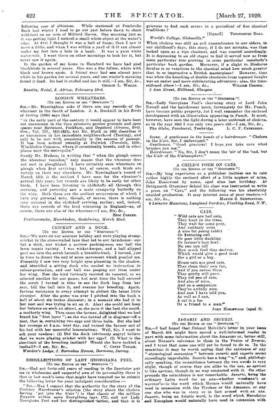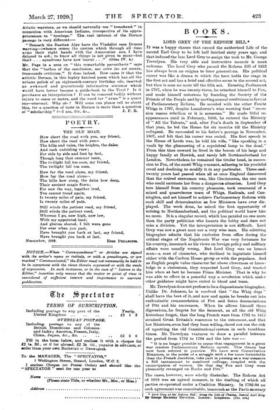SAGA-BIS AND SECIIRIS.
(To roe Boer= or THE " SPECTATOR."1 had hoped that -Colonel Mel-villa's letter in year issue of 'March 6th might have moved a well-informed -reader to part-with -some information about the Amazons or, better -still, about Horace's reference to them in the Praise of Drztsus, -and I trust that some one will yet be found to do so. 'In the meantime it may be worth saying that the existence of any "-etymological connexion" between securis and sagaris seems exceedingly improbable. Securis has a long "u," and, philologi- cally speaking, the resemblance between the two words is very alight, though of course they are alike to the eye, as apricot is like apricus, though in no way connected with it. On other grounds the coincidence is not-remarkable. Securis, being the ordinary Latin -word for an axe—whether woedman's or warrior's—is the word which Horace would naturally have used in connexion with the Tireless or the Amazons, or any one else who was in story or in fact armed with an axe. Sagaris, being an Asiatic word, is the word which Harodotus -end Xenophon _would -naturally have used in connexion with Asiatic warners, as we- should naturally use " tomahawk" in connexion. with American. Indians, irrespective of ita appro- priateness: to "tomb/rya." The real_ interest of the Horace passage is very different:—
" Beneath the Raetian Alps have the Vindelici seen Drnsus warring,-(whence comes the custom which through all time arms their right hands with the Amazonian axe, I have delayed to ask; to know all things is not given to man)—bat their. . . squadrons have now learnt. . ." 4.)
Mr. Page in a note on "this remarkable parenthesis" says that the " bathos of the conclusion. nee scire fax est orania, transcends criticism." It does indeed. How cameit that the artistic Horace, in this highly finished poem which has.all the urbane polish of an eighteenth-century birthday ode, inserted an awkward and gratuitously informative sentence which would have better become a_ guide-book to the Tirol ? Is it perchance an interpolation ? It can be removed bodily without injury to sense or metre. and the word for "arms" is a queer one—obarmet. Why oh-? Will some one please tell us about this, for a question of taste in Horaee-is more than a question of"scholarship." P-1 am, Sir, &c., I. F. R.



































 Previous page
Previous page